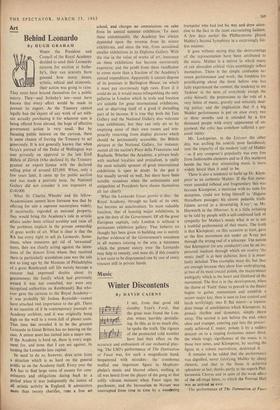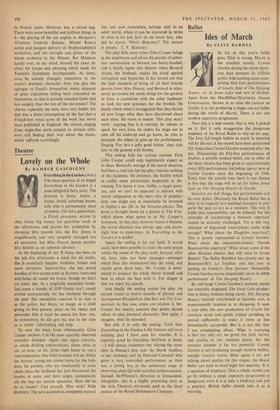Music
Winter Discontents
By DAVID CAIRNS
I SEE, from that good old standby Toye's Verdi, that the great man found the Lon- don winter horribly devitalis- ing. In this, as in so much else, he spoke the truth. The rigours of the protracted cold weather have had their effect on the accuracy and enthusiasm of our orchestral play- ing. The LSO's performance of The Damnation of Faust was, for such a magnificent band, bespattered with mistakes: the trombones muffed one important figure in Mephisto- pheles's music and blurred others, nothing at all was heard from the player of the gong at that softly vibrant moment when Faust signs the parchment, and the Invocation to Nature was interrupted from time to time by a wandering trumpeter who had lost his way and drew atten- tion to the fact in the .most excruciating fashion.
A few days earlier the Philharmonic played Mahler's Second Symphony in a surprisingly list- less manner.
It goes without saying that the shortcomings of the representation have been attributed to the music. Mahler is a mirror in which many of our absurdest critical vices unwittingly reflect themselves. There is the simple confusion be- tvVeen performance and work; the fondness for pontificating about the form before one has fully experienced the content; the tendency to see 'fashion' in the taste of everybody except the critic himself; the pretensions to the role of a very Solon of music, gravely and minutely deal- ing justice; and the implication that if a big Mahler performance is put on once every two or three months and is attended by a few thousand people with every appearance of en- joyment, the critic has somehow suffered a per- sonal injury.
Mr. Lockspeiser, in the Listener the other day, was arching his nostrils most fastidiously over the impurity of the modern 'cult' of Mahler —as if any composer's popularity was ever free from fashionable elements and as if this mattered beside the fact that stimulating music is more widely heard than it used to be.
There is also a tendency to build up Dr. Klem- perer-as an authentic Mahler. If the first move- ment sounded inflated and fragmentary this was because Klemperer, a musician with no taste for deception, could not bring himself to 'disguise threadbare passages; his almost pedantic truth- fulness served as a devastating X-ray'; so Mr. Heyworth in the Observer. It is a little irritating to be told by people with a self-confessed lack of sympathy for Mahler's music what is or is not a truthful performance of that music. The truth is that Klemperer, on this occasion at least, gave us the first movement not under an X-ray but through the wrong end of a telescope. The notion that Klemperer (or any conductor) can be an im- personal medium through which we receive 'the music itself is at best dubious; here it is mani- festly deluded. Tivo examples must do, but they are enough because they show him underplaying, at two of its most crucial points, the major-minor ambiguity which is the heart and lifeblood of the movement. The first is in the development, when the theme of 'Faith' (later to prevail in the finale) begins to gather momentum and establish a secure major key, then is seen to lose control and lurch terrifyingly into E flat minor--a tremen- dous image of annihilation which Klemperer, by prosaic rhythm and dynamics, simply threw away. The second is just before the end, when oboe and trumpet, entering ppp into the precari- ously achieved C major, poison it by a sudden descent on to a rasping fortissimo minor third; the whole tragic significance of the music is in those two notes, and Klemperer, by starting the figure at a robust mezzoforte, destroyed it.
It remains to be added that the performance was dignified, never falsifying Mahler by cheap rhetoric, and that in the finale it achieved splendour at last, thanks partly to the superb Phil- harmonia Chorus and in spite of the weak effect of the off-stage brass, to which the Festival Hail was as unkind as ever.
The performance of The Damnation of hoot in French under Monteux was a mixed bag. There were some beautiful and brilliant things in it—the playing of the cor anglais in Margaret's `D'amour l'ardente flamme,' Michel Roux's subtle and pungent delivery of Mephistopheles's recitatives, and the strength and glitter of the whole orchestra in the Minuet. But Monteux hardly ever, to my mind, showed the exact in- stinct for tempo and phrasing which made his Fantastic Symphony incomparable. At times, even, he seemed strangely insensitive to the music's dramatic character—how else play the epilogue to Faust's Invocation, music eloquent of great aspirations falling back exhausted on themselves, so that it actually sounded faster and less weighty than the rest of the movement? The chorus, especially the men, were very feeble, but that was a direct consequence of the fact that a French-text vocal score of the work has never been published in England; the chorus, singing from single-line parts notated in antique clefs, were still finding their way about the music, which suffered accordingly.



































 Previous page
Previous page